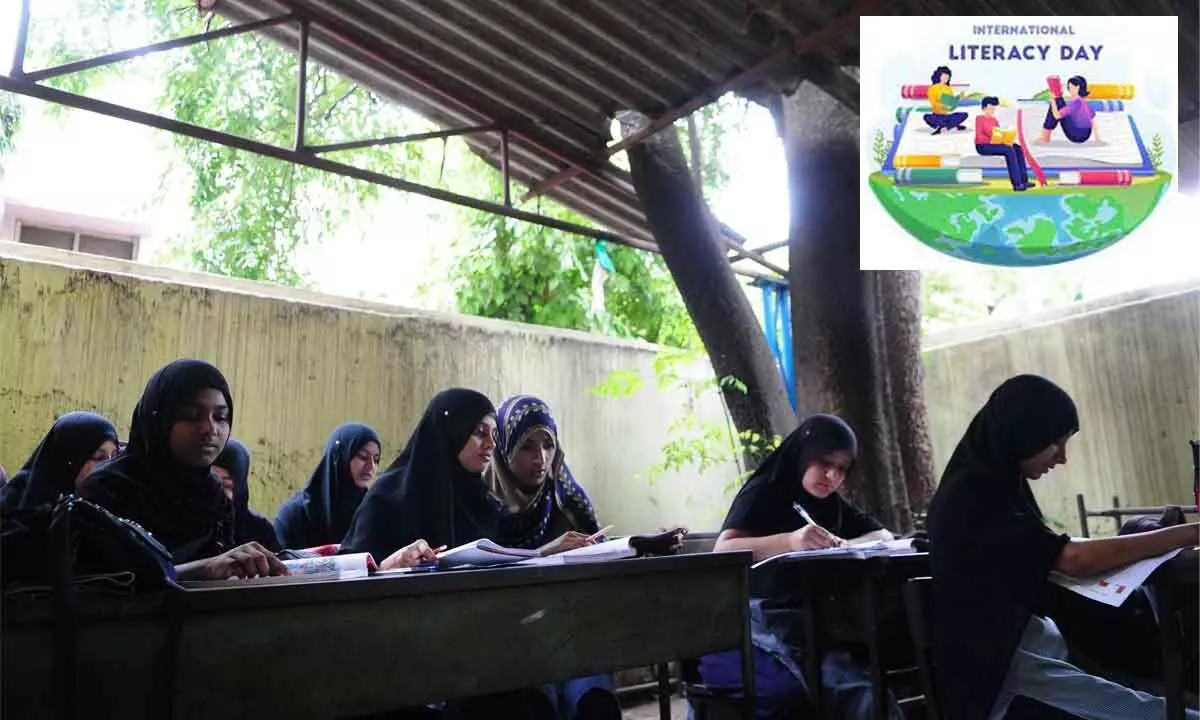Live
- India Faces Blow as Pacer Mohammed Shami Ruled Out for Remainder of Australia Series
- Farmer’s Day Celebrations Held at Palem Agricultural Research Center, Nagarkurnool
- Biden Pardon: Joe Biden Commutes Death Sentences of 37 Inmates, Including Child Killers and Mass Murderers
- South Korea: Yoon believes impeachment trial takes priority over martial law probe
- Strict Action for Non-Adherence to Time Management - DMHO Dr. Swarajya Lakshmi
- Joyful Semi-Christmas Celebrations at Sri Saraswathi International School
- Over 13.29 lakh houses approved for rural poor in Maharashtra: Shivraj Chouhan
- District Collector Urges Timely Completion of Indiramma Housing Scheme Survey
- Digital Arrest Scam: Hyderabad Man Duped of ₹7 Lakhs by Fake Crime Branch Police Callers
- Sukhbir Badal seeks President's Police medal for officer who saved his life
Just In
International Literacy Day: Teachers flag concerns over extensive use of English


- Teachers raise concerns about extensive use of English
- Emphasis on English in corporate schools creates language barrier for govt school students
♦ Pressure to excel in English leads to higher dropout rates in govt schools
♦ Govt should focus on better opportunities for poor people to improve literacy rate
♦ Every mother tongue should be given same importance as English
Hyderabad: On the occasion of International Literacy Day, teachers raised concerns about the extensive use of English as a medium at the school level in education. They said English could be one of the main reasons for the increasing dropouts at the high school level. The official data explained Telangana literacy rate was 66.54 per cent this year. Teachers stressed the importance of imparting education in the mother tongue and promoting the use of English gently.
According to Ministry of Education data this year, Telangana's literacy rate of 66.54 per cent is lower than the all-India average of 72.98 per cent based on the 2011 census. Literacy in rural areas is even lower, at 57.30 per cent, compared to the national average of 67.77 per cent. In Telangana, the dropout rate at the primary level is zero, while it is 3.1 per cent in primary education and 13.7 per cent in secondary education, and overall the dropout rate of boys is higher than that of girls.
“Every day is an important occasion to reflect on literacy issues. The discrepancy in the approach to English language education between corporate schools and government schools can indeed have a significant impact on literacy rates. The emphasis on English in corporate schools can create a language barrier for students from government schools, making it harder for them to access higher education and job opportunities, thereby impacting literacy rates. Corporate schools often have better resources, including trained teachers and learning materials. This disparity can result in government school students receiving a lower-quality education due to local conditions, affecting their literacy skills, said Shekar Rao, an educator.
“The pressure to excel in English can lead to higher dropout rates in government schools, contributing to lower literacy rates, as students may feel overwhelmed or disconnected from the education system. The dichotomy in language education can exacerbate socioeconomic inequalities, as students from wealthier backgrounds have easier access to quality English education, while others may struggle. To improve the literacy rate, State governments should address these disparities by investing in teacher training, curriculum development, and ensuring equitable access to quality education in multiple languages. A balanced approach to language education is crucial,” said Mamatha, a private school teacher.
“The unequal approach to English language education in different types of schools can impact literacy rates by exacerbating disparities, leading to dropout rates, and perpetuating inequality. Especially in government schools, we can see these differences. Last year the State government abruptly imposed English, and we saw a lot of difficulty in students for grasping the language, and this year we have seen minimum enrollment of students in intermediate. Improving the literacy rate should be the prime responsibility of any government that plans for the development of the country. Along with English language, Telugu language or any other mother tongue should be given same importance then spontaneously the literacy rate will increase,” said MutyalaRavindar, a government school teacher in Nallakunta.
Everybody who passes high school will not become an engineer, doctor, or a bureaucrat but depending upon their interest and market conditions they will plan the rest of their life. Literacy will familiarise the farmers with new trends in farming, and the effects of pesticides and fertilisers, whereas illiterate farmers need to depend on the government for everything. The achievement of a good literacy rate in any country does not affect industrial production and growth but can surely produce products of good quality resulting the national financial growth. Hence the government should focus on better opportunities for the poor people at their habitations to improve literacy rate and provide a better future for all, he added.

© 2024 Hyderabad Media House Limited/The Hans India. All rights reserved. Powered by hocalwire.com






